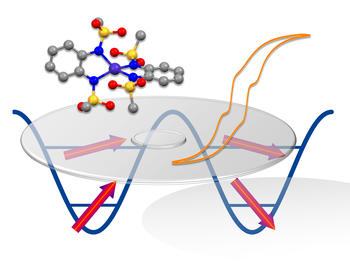Storing Information at the Molecular Level
Scientists at Freie Universität Berlin, Universität Stuttgart, and the Max Planck Institute of Chemical Energy Conversion (MPI CEC) in Mühlheim Discover Molecule with Stable Magnetization
Mar 02, 2016
Impression of how molecules might be incorporated in next-generation hard drives, with the structure of the molecule (top left), the magnetic hysteresis curve (top right) and the energy barrier between up and down orientation of the magnetic moment.
Image Credit: Professor Joris von Slageren, Universität Stuttgart
Imagine storing a thousand times more information on your hard disk: Miniaturization of devices is an important goal in contemporary science and technology. Data storage devices form the cornerstone of the technologically advanced world that we live in. In current data storage devices information is currently stored at the macroscopic level, but the ultimate aim is to be able to store information in individual molecules. So far this vision has remained beyond the reach of scientists.
The groups led by Professors Sarkar (Freie Universität Berlin), Van Slageren (Universität Stuttgart), and Neese/Atanasov (MPI for Chemical Energy Conversion, Mülheim an der Ruhr) have now achieved a major breakthrough by developing the first single-transition metal ion complex with stable magnetization, which they have published in the high-ranking interdisciplinary journal Nature Communications.
Single molecule magnets are promising candidates for performing data storage at the molecular level, due to their stable magnetization. The stability of the magnetization increases with increasing spin of the molecule and with increasing magnetic anisotropy. However, increasing spin leads to decreasing anisotropy and thus the magnetization does not become more stable. Manipulating directly the magnetic anisotropy through rational chemical design of single molecule magnets is extremely challenging.
PhD student Margarethe van der Meer (Berlin) prepared the fully air- and moisture stable compound. She says, "I was looking to make larger molecules with more metal ions, but I was fascinated to learn that even smaller molecules work just as well!" The in-depth investigation by PhD student Yvonne Rechkemmer (Stuttgart) led to a full understanding of why this molecule has such favorable properties. "It is one thing to find an interesting material by accident, it is quite another to be able to formulate clear design principles for even better materials," she says. The state of the art calculations by Professor Atanasov clarified exactly how the molecular structure is related to the magnetic stability. The next step is now to further improve the material in order to increase the operating temperature of the system. Professor Sarkar says, "We have plenty of ideas of how to improve the material further, now that we understand where its properties come from."
The work was financially supported by the Deutsche Forschungsgemeinschaft (DFG) and the Max Planck Society.
This text was originally published on February 19, 2016, as a press release.

